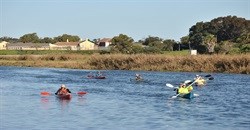In an attempt to raise awareness around the issues of pollution and degradation of Cape Town's waterways, this Sunday a 27km paddle will take place across the city via the inland network of rivers, lakes and canals.

Peninsula paddlers on course
"This paddle highlights a crucial conservation issue. Our rivers and lakes are the lifeblood of our environment - if we damage these, we destroy entire ecosystems and our living conditions deteriorate," says Conservationist Braam Malherbe, who will be the celebrity paddling with the group.
From an adventure to an annual event
The paddle originated in 2010, when four social and environmental activists, Thomas Cousins, Trevor Johnston, Alistair Lee, and Kevin Winter, first explored the potential to navigate via Cape Town's waterways from one side of the Peninsula to the other, with no idea that their adventure would raise so much interest.
Now in its fifth consecutive year, the Peninsula Paddle has become an annual Cape Town event that coincides with World Environment Day celebrated around 5 June every year. The first four paddlers took over 11 hours to complete the journey of about 27km. They were appalled at what they saw. Sections of the canals and lakes were filled with solid waste, an abundance of plastic bottles and bags, along with submerged and floating weeds, covering large sections of the route.
The paddlers spent more time portaging around the waterways than paddling. In addition to the badly degraded waterways and poor water quality, they were alerted to pressing social issues alongside and seeming inability of citizens to address the circumstances.
2014 paddle organiser Kevin Winter says: "The journey across the Peninsula is one of social, economic and environmental contrasts - we live in a divided city - but the stark relativity is that we are all connected to the waterways. We have to ask what unifying role the waterways can play in transforming our city and healing historical divisions."
Small but significant changes
Now, five years later with persistent attention to this question along with a growing number of paddlers, there is comfort in small, but significant changes that have already taken place.
These challenges are deeply embedded in the socio-economic and political history of the city, but the pressure is mounting with rapid urbanisation and population growth, increasing demand for services, and often the results of inappropriate urban planning in close proximity to the waterways. Human behaviour and lifestyle choices ultimately contribute to fouling the urban waterways. What is acceptable and what is not is no longer a fine line. The rules have changed resulting in new forms of impacts on the environment and society. This is not the time to stop asking questions or thinking about how to deal with problems that will enable civil society to take action.
Ins and outs of the paddle
The paddle launches at 6:30AM on 8 June 2014, leaving from Muizenberg Beach and entering Zandvlei (Marina da Gama). The paddlers portage from Marina da Gama/Steenberg Canal to Princess Vlei. Once they have crossed Princess Vlei they portage to Plumstead Canal. Coming out of the canal, the paddlers load their crafts onto trailers and ride bicycles on the M5 to Access Park. They enter the Krom River, paddle and then portage to Black River alongside Rondebosch Golf Course. From there they proceed along the Liesbeek River to Observatory, River Club & Valkenburg Hospital, then on to Woodstock Beach. The group then cuts across to Milnerton Estuary and lagoon, finishing at the Milnerton Canoe Club at about 16:00PM.
The paddle passes through many neighbourhoods of the city and each year it has highlighted the urgent need to deal with the social and environmental conditions in and around Cape Town's inland waterways.
The waterways traverse the city, crossing historical and political divisions, as well as through rich and poor areas. Paddlers cannot fail to notice these differences and at the same time recognise the opportunities and challenges.

Peninsula Paddle Princess Vlei
Winter believes that the city works with the people in improving sections of the waterways that bring people together, for example, Princess Vlei, an area in Sybrand Park and parts of the Black River.
"We need to make space for people to enjoy and value these waterways, improve the conditions, and encourage nature to return to urban life," says Winter.
A good example is seen in the hundreds of flamingos feeding in the Black River, once one of the most heavily polluted urban rivers in Cape Town. The sight of these birds on the river has already created public interest. Another example is the active citizen involvement and sustained efforts of the Princess Vlei Forum, which has successfully persuaded city officials not to allow a shopping mall to be built in the vicinity of the vlei.
The Kader Asmal Project
Already in 2013, paddlers enjoyed cleaner, safer waterways thanks largely to the City of Cape Town's Kader Asmal Project, an initiative that was started by the City Mayor soon after the Peninsula Paddle in 2011. The Kader Asmal Project is a public works programme that employs over 200 previously unemployed people whose tasks range from cleaning, planting and rehabilitating 18 rivers across the city. This contribution has made a noticeable difference. The Black River, for example, was once choked with weeds and is now a spectacular section of the Peninsula Paddle although it still has a long way to go before being pronounced 'safe and healthy'.
"The Peninsula Paddle is driving an important conservation message. Everyone living in Cape Town can contribute to enhancing the environment, whether it's by picking up litter or planting a tree. This project shows that if we each 'Do One Thing' (DOT), collectively we will make a difference," concludes Malherbe.




































